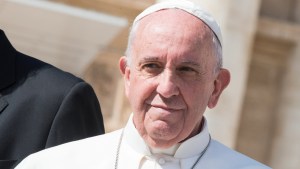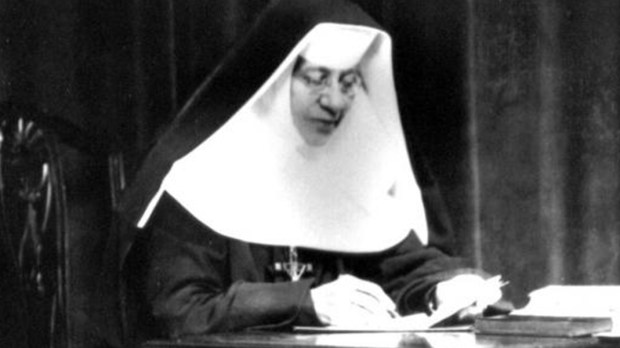As we enter the biggest spending season of the year, it’s easy to get caught up in materialism, to long for the newest, fastest, most expensive version of various gadgets, to look ahead to high-ticket vacations or experiences. Even those of us without the means to afford anything opulent can find ourselves fantasizing about what we would buy if given the money, or even just collecting various less expensive items as a substitute. For Americans, this is particularly troubling, as we follow up a day designated for gratitude with a weekend of excessive consumption.
The saints understand. Though many lived in poverty all their lives, others made deliberate choices to renounce their inheritances, leave behind their wealth, or dole it all out to others. When we find ourselves caught up in the commercialism of the weeks before Christmas, these saints can stand beside us, encouraging us to let go of our greed and envy and pour ourselves out instead for the poor and the needy.
St. Fabiola of Rome (d. 392) was a Christian noblewoman in the Roman empire. Married to a cruel man, Fabiola left him and obtained a divorce. There was no sin in that, of course—the Church has always permitted spouses to separate in cases of abuse and adultery. But Fabiola chose to remarry, despite the clear teaching of Jesus, and spent many years away from the Church. When her second husband died, though, Fabiola did public penance and returned to the Church. To remove herself from the temptations of the world, she then sold all her property to build the first hospital in the West, then offered herself in service to the poor who came to her hospital, nursing people with the most unpleasant of conditions. She traveled from one island to another seeking the lost and abandoned, offering comfort and healing and financial support to all. When she died, she was mourned by all of Rome.
St. Lucy Pak Hiu-sun (1801-1839) was a beautiful and well-educated Korean noblewoman who became lady-in-waiting to the queen. She spent 15 years in the palace, but on hearing the Gospel proclaimed for the first time, she knew she couldn’t follow Jesus in such a life of luxury, much less one that was so filled with non-Christian practices. Though her appointment was generally considered lifelong, Lucy feigned an illness and obtained permission to return home, at which point her anti-Catholic father threw her out of the house. She then lived very simply in the homes of various family members and converted many of them, including her older sister, St. Maria Pak Kun-agi. When they were arrested for their faith, Lucy said, “Nothing happens without God’s permission. Since this is God’s will, let us accept it willingly.” After severe torture, the sisters were martyred.

Read more:
Pope Francis to business students: If you worship money, you’ll become a slave
St. Anthony Nguyễn Hữu Quỳnh (1768-1840) was a Vietnamese soldier, husband, father, doctor, philanthropist, catechist, and martyr. As a high ranking official and a physician, he ought to have been quite wealthy; instead, he treated the poor for free and gave away all that his family didn’t strictly need. When his wife complained, he responded, “If you and the children do not allow me to take our fortune to help people, then I will work or borrow money to assist them.” When Quỳnh was arrested at 72, he continued to practice medicine in prison up until his martyrdom.
Servant of God Demetrius Augustus Gallitzin (1770-1840) was a Russian prince who gave his life (and his fortune) in the service of Catholics in the Allegheny mountains. After a dazzling childhood as a nominally Orthodox prince, Augustus converted to Catholicism at 17. On his opulent tour of North America, he decided to give up his inheritance and enter the seminary. After ordination, Fr. Augustus moved to the frontier, where he bought tens of thousands of acres of land and gave or sold it to Catholics, building something of a Catholic empire in the Alleghenies and driving himself into appalling debt in the process. The prince raised in luxury lived the rest of his life in evangelical poverty and only barely managed to crawl out of debt before his death. He had no regrets.
St. Katharine Drexel (1858-1955) was a Philadelphia heiress. While her life was luxurious, though, her father and stepmother taught her the importance of serving the poor personally. Three times a week, the Drexels would receive people in heir home and give out food, clothing, and money. But this wasn’t enough for Katharine. Despite the misgivings of many who loved her (and felt sure that the society girl could never survive a life of poverty, chastity, and obedience), Katharine renounced her fortune and founded a religious order for the service of Black and Indigenous people. Her sacrifice made headlines, as people were shocked at a woman who would give up seven million dollars (the equivalent of some 200 million today). Mother Katharine spent the rest of her life traveling the country setting up convents and schools to serve the people she loved.

Read more:
Living as a Christian is already a reproach to the world: Pope Francis

Read more:
Pope begins new year calling for end to consumerism that sacrifices women’s bodies

